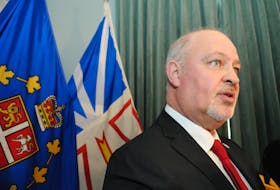ST. JOHN'S, N.L. — Fox Power has had a lot of time to catch up on his reading — he’s been in St. Clare’s Hospital for weeks awaiting cardiac bypass surgery.
Power says preventing long wait times and lengthy stays in hospital should be a focus of the provincial election. He says he would rather be sent to Halifax or Ottawa for the heart procedure than be stuck waiting in a hospital room since early April.
“Sitting around here, I am a ticking time bomb,” he said.
Power said he drove himself to the emergency department at St. Clare’s after pains in his chest would not go away. Lying down made them worse, and he thought it was just an indigestion episode or stomach problem.
“I never had a heart attack before. I never knew the difference,” said Power, who walks regularly, doesn’t drink and quit smoking 50 years ago.
Tests confirmed what happened and he soon had a sheet documenting the blockages in his heart. According to Power, he was told he would need open heart surgery — a triple bypass — and he thought it would be done in about a week.
“I’m still here,” Power said. “I am beginning to call this a hotel.”
After The Telegram talked to Power Thursday, he said he was finally given some information Friday morning about where he was on the wait list.
But for Power, long waits for people in hospital awaiting procedures is a clear-cut example of how health care costs are driven up — if waits were shorter or people were sent out for procedures, beds would be freed up.
But Power, a St. John’s cab driver and musician who has played with his Mundy Pond bandmates since the early 1960s, said he can’t be sent home due to risk, and if he does try to go home, it will put him at the end of the wait list.
Common to wait
Eastern Health won’t discuss specific patients due to privacy laws, but said in an emailed statement it is relatively common for a patient waiting for cardiac surgery to be an inpatient at any health-care facility in the province.
The decision to keep a patient in hospital is made by the attending physician, Eastern Health said, and the length of stay depends on the patient’s priority level, and the waitlist is reviewed daily.
Outpatients are considered to be stable and would, therefore, have a longer wait time than a higher-priority inpatient, the health authority said.
However, sudden changes in any patient’s health status could result in an increase in priority status to receive surgery.
If an outpatient has any concerns about his or her status or if at any time there are changes to his or her medical condition while awaiting a procedure, the patient should notify the physician or visit an emergency department, Eastern Health stated.
Surgeries are scheduled based on priority, and wait times vary depending on patient urgency ratings, the health authority said.
There are three national benchmark levels used to determine a patient’s priority and wait time for surgery:
Level 1 — urgent (surgery within 14 days);
Level 2 — semi-urgent (surgery within 42 days);
Level 3 — elective (surgery within 182 days).
Eastern Health’s most recent data on wait times for cardiac bypass surgery (for the period Oct. 1, 2018 to Dec. 31, 2018) shows that 100 per cent of patients classified as Level 1 had their surgeries performed within the 14-day benchmark. One-hundred per cent of patients classified as Level 2 had their surgeries within the benchmark of 42 days, and 97.4 per cent of Level 3 patients had surgery within the 182-day benchmark.
The number of inpatients awaiting cardiac surgery at any given time within the province varies, but averages between 15 and 20.
Time of treatment
According to the Canadian Institute for Health Information’s 2018 report on cardiac care, the pan-Canadian benchmark for bypass surgery for non-emergency cases specifies surgery within two to 26 weeks (14 to 182 days), depending on how urgently care is needed.
In Newfoundland and Labrador, half of the patients were found to have been treated within six days, and 90 per cent of the patients within 103 days.
Patients requiring bypass surgery in Ontario, however, were able to get it within 43 days 90 per cent of the time.
In Nova Scotia, 90 per cent of patients had their bypass surgery within 27 days, and 50 per cent had it within three days.
Overall, across the country, 90 per cent of patients had surgery within 55 days.









